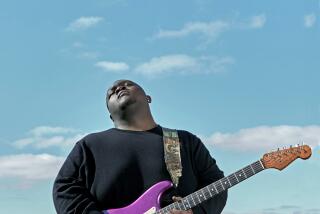CRAWFORD--THE MAN WITH A SONG IN HIS HORN
- Share via
“Singing”--with his alto saxophone, not his voice--is what Hank Crawford’s soulful, bluesy musical concept is all about.
“My approach to the horn has always been vocal,” the lanky musician said in a phone conversation from his home in Manhattan. “When I was younger, I was influenced by guys like Tab Smith, Louis Jordan, Earl Bostic and Charlie Parker, who all had vocal styles.”
In turn, Crawford, 52, who plays Marla’s Memory Lane New Year’s Eve and Friday-Saturday, has served as the primary influence for several contemporary players, most notably David Sanborn.
Crawford--whose classic Atlantic albums like “More Soul” and such recent Milestone LPs as “Soul Survivors” and “Roadhouse Symphony” find his searing, vibrant sound backed by a three- to four-piece horn section--sees himself “like a vocalist, with the horns my back-up group, like a choir. That’s what happens in a big band, too. Your band is your support group behind the soloist, and I’ve always liked the support a group like that could give you.”
The vocal approach has also given Crawford a style that he considers unusual--”I’m one of a few that’s playing this way currently”--and that enables him to “speak” to audiences. “This way people understand what I’m doing,” he said. “It’s like they hear the words with me,” as if he were a singer.
As important as his “singing” sound is his playing, to quote an early Crawford LP title, “From the Heart.” “I think I’m basically rooted in the blues,” he said, “and from the blues, I found out that’s what people respond to in music--feeling. That’s why the blues gets across to so many people--they’re so simple and they’re about feeling.”
“Feeling” can be as mysterious a commodity in music as “swing.” Neither is easily definable and, as Crawford says, “feeling is not something you learn in school. It’s a natural situation.”
Crawford says feeling depends on the player, not the tune or the tempo. “You can be playing fast as lightning and the rhythm section can be perfect, but if the soloist isn’t projecting, then, like Duke Ellington said, ‘It Don’t Mean a Thing (If It Ain’t Got That Swing).’
“I found out as a young musician growing up in Memphis that if you weren’t reaching people, and having them pat their foot, then there was nothing happening. So I’ve always played for the average listener, rather than the jazz die-hard.”
Along these lines, the saxman says that “I play a lot of bebop on my live dates; on my recordings I mainly stick to blues and ballads, because of the commercial value.”
Crawford, who has been leading his own bands since he concluded a five-year stint with Ray Charles in 1963, obviously knows what he’s doing: he tours at least eight months a year, with several trips to Europe included, and his records “are selling very well.”
Having a distinct style does have its minor drawbacks, Crawford admits, like having to play such old favorites as “The Peeper,” a medium bounce blues, every night. “Oh, I might get tired of playing ‘The Peeper,’ which has become my ‘One O’Clock Jump,’ but if I don’t play it, then I don’t establish my identity.
“And having your own identity, you’re going to sound like yourself all the time, but that’s what sells. You can get tired of playing one groove, but it’s your groove.”
Crawford grew up in Memphis, which was an ideal musical melting pot for a fledgling player. He played “bebop all day long” with future heavyweights like saxophonist George Coleman and pianist Phineas Newborn, “but at work at night we had to play dance music.”
In 1958, he joined Charles. “That was an important part of my career,” he said. “I had been writing in a similar style to Ray’s--I’ve always been interested in writing--and so his band was right up my alley.
“Ray also taught me about playing slow. With Ray, a slow tune sort of floats. Again, it’s something that you feel, not something you learn.”
Crawford credits his continued success to adamantly being himself, musically. “I’ve been pretty consistent and I think that’s because I have been true to what I want to play. I think if I had been anything else, had tried to tackle any other style, as far as selling myself, I would have lost.”
More to Read
The biggest entertainment stories
Get our big stories about Hollywood, film, television, music, arts, culture and more right in your inbox as soon as they publish.
You may occasionally receive promotional content from the Los Angeles Times.








